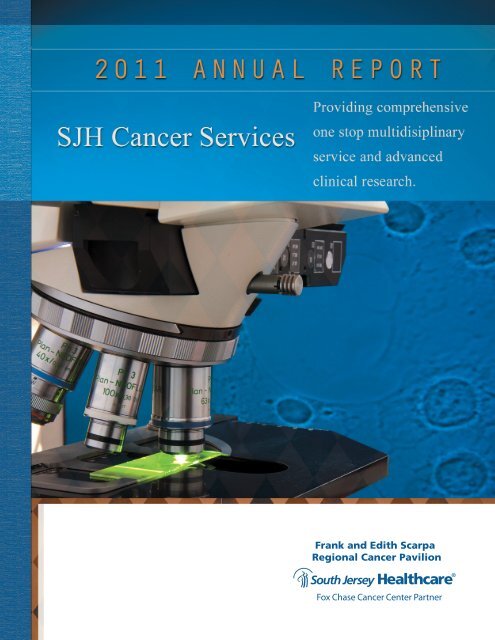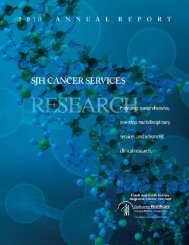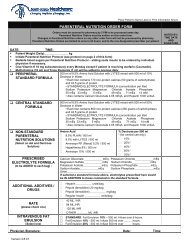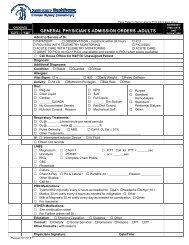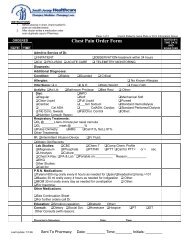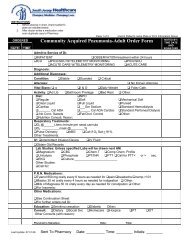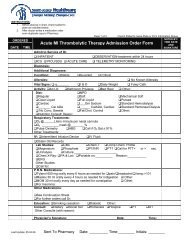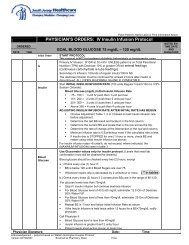2011 Cancer Annual Report (PDF) - Inspira Health Network
2011 Cancer Annual Report (PDF) - Inspira Health Network
2011 Cancer Annual Report (PDF) - Inspira Health Network
Create successful ePaper yourself
Turn your PDF publications into a flip-book with our unique Google optimized e-Paper software.
A Message from the<br />
President and CEO<br />
Today there are more good reasons than ever to<br />
stay close to home if you, or a loved one, need<br />
cancer care. Our communities have been blessed<br />
for many years with highly skilled compassionate<br />
medical and radiation oncologists. Local surgeons<br />
have stepped up to provide surgical treatment options for numerous types of cancer.<br />
Area residents have also benefitted from the nationally certified oncology nurses,<br />
experienced radiation therapists and caring support staff that provide high quality<br />
patient-focused care day in and day out. Our long-term partnership with Fox Chase<br />
<strong>Cancer</strong> Center continues to enhance our program, while making dozens of cancer<br />
research studies available locally.<br />
In just the past few years, we have added several oncologic surgery sub-specialists, new<br />
technologies and expanded research to our program. And of course, our expanded<br />
Frank and Edith Scarpa Regional <strong>Cancer</strong> Pavilion brings all of these services to one<br />
convenient location.<br />
As you look over this year's annual report, take special notice of the scope and breadth<br />
of cancer services that South Jersey <strong>Health</strong>care now provides. Much has changed since<br />
the earliest days of our cancer program, but our commitment to providing high quality<br />
care -close to home-- remains our guiding principle.<br />
Chet Kaletkowski, SJH President and CEO
<strong>Report</strong> from the Assistant Vice President of Oncologic<br />
and Women's <strong>Health</strong> Service Lines<br />
The mission of South Jersey <strong>Health</strong>care is to provide high quality health care that improves the<br />
lives of all we serve. To achieve this mission, SJH is committed to delivering the full continuum of<br />
primary, acute, and advanced health care services. The institution's dedication to this mission is<br />
clearly demonstrated in the ongoing growth and development of SJH <strong>Cancer</strong> Services. The 2010<br />
opening of the expanded Frank and Edith Scarpa Regional <strong>Cancer</strong> Pavilion brought all of our cancer<br />
resources together in one location, making the program much more patient-centered and<br />
greatly improving patients' ability to access the full continuum of services that are offered to support<br />
the cancer patient.<br />
Access is a critical component of health care and SJH is committed to providing advanced cancer<br />
care right here in our community. The SJH <strong>Cancer</strong> Program continues to expand the scope of services<br />
that it offers, with these efforts guided by a three-year, cancer-specific strategic plan. The<br />
cancer strategic plan outlines initiatives that will enable advancement of the program overall, as<br />
well targeted progression in providing care for several specific diseases, such as breast and lung<br />
cancer. Deliberate focus on physician recruitment resulted in not only the addition of new physician<br />
specialties such as surgical endocrinology, but also in expanded physician availability for subspecialty<br />
services for gynecologic, breast, and lung tumors.<br />
The addition of high dose rate brachytherapy (HDR) has enabled us to deliver even more precise<br />
radiation therapy in a shorter amount of time - for some patients reducing their treatment time by<br />
nearly 80 percent. Our clinical research program continues to accrue patients to both treatment<br />
and non-treatment trials, providing a direct link between our cancer program and the latest investigative<br />
breakthroughs in cancer care. These accomplishments represent SJH's overall commitment<br />
to the cancer program and to lessening the burden of cancer for our community.<br />
Michelle Marshall, M.B.A.
<strong>Report</strong> from the Director of <strong>Cancer</strong> Services<br />
We celebrated our first year in the newly expanded Frank and Edith Scarpa Regional <strong>Cancer</strong><br />
Pavilion by installing beautiful artwork throughout the cancer center in the spring. The "Colors of<br />
Hope" project, a partnership between South Jersey <strong>Health</strong>care, the Noyes Museum and the<br />
Cumberland County Cultural and Heritage Commission, invited artists from Southern New Jersey<br />
to submit their work. Twenty pieces were selected for the new cancer center and donors<br />
graciously placed plaques in memory and honor of loved ones.<br />
<strong>Cancer</strong> prevention education, cancer screening services and comprehensive cancer treatments,<br />
including new therapies offered in clinical research studies, are provided in a caring, efficient and<br />
personalized manner in the expanded Scarpa <strong>Cancer</strong> Pavilion. SJH cancer specialists and subspecialists<br />
work closely with one another to coordinate patient care and to provide supportive<br />
services along the way. Our Breast Center physicians and nurses are planning for national<br />
accreditation as a center of excellence in 2012.<br />
Just as there are physician specialists in cancer care, registered nurses specialize in oncology as<br />
well. South Jersey <strong>Health</strong>care has seven nationally certified oncology nurses and one advanced<br />
oncology certified nurse in the cancer center.<br />
SJH physicians and professional staff continue to benefit from our partnership with Fox Chase<br />
<strong>Cancer</strong> Center by having increased access to continuing education programs, mock surveys for<br />
planned inspections, and quality reviews and projects we participate in routinely. Patient<br />
satisfaction scores continue to be excellent and many patients have voiced approval of the new<br />
facility and the fact that most, if not all, of their cancer care can be obtained in one location.<br />
Members of the community demonstrated generosity to the cancer center many times<br />
throughout the year: The Elmer Rotary, the Soroptomist International of Cumberland County,<br />
the hundreds of men and women who donated to the Breast <strong>Cancer</strong> Bridge and the cancer<br />
center, all helped to support our mission. The Barbara Cook <strong>Cancer</strong> Foundation and the Bill<br />
Bottino Mud Run for <strong>Cancer</strong> raised $50,000 for SJH <strong>Cancer</strong> Services.<br />
Melanie Pirollo, M.S., R.N., A.O.C.N.
<strong>Report</strong> from the SJH <strong>Cancer</strong> Program Medical<br />
Director and <strong>Cancer</strong> Committee Chairman<br />
The South Jersey <strong>Health</strong>care cancer program continues to grow and provide high quality<br />
cancer care to the citizens of Cumberland County and beyond. Since my report last year,<br />
there have been several changes that have positively impacted the program:<br />
• We now have an active and excellent breast cancer service. This has<br />
significantly increased breast cancer surgical procedures performed at<br />
SJH. We also have a very active breast cancer tumor board which meets<br />
twice a month. We have applied for national accreditation as a breast<br />
care center of excellence and will be surveyed March 1, 2012.<br />
• We have developed a much-needed plastic surgery service and have been<br />
able to provide various forms of reconstructive surgery, particularly for<br />
breast cancer patients.<br />
• Surgical oncology care continues to expand and we have been able to<br />
provide additional surgical procedures, such as resecting metastatic liver<br />
disease.<br />
• As noted previously, gynecologic oncology care has grown rapidly, and<br />
women rarely have to travel outside the area for this specialized care.<br />
• We have also added quarterly GU tumor boards in collaboration with Fox<br />
Chase <strong>Cancer</strong> Center via teleconference.<br />
Other aspects of the cancer program, such as cancer committee, outreach programs,<br />
and research have all been functioning efficiently. In conclusion, the overall state of the<br />
South Jersey <strong>Health</strong>care <strong>Cancer</strong> Services remains sound, and we will continue our efforts<br />
to provide our patients with the highest quality service.<br />
Rama Sudhindra, M.D.
<strong>Report</strong> from the <strong>Cancer</strong> Liaison Physician<br />
In <strong>2011</strong>, South Jersey <strong>Health</strong>care continued to expand the format of its tumor boards,<br />
which have been very well attended. In July, the health system welcomed several<br />
medical residents and we have invited them to our meetings, which have been even<br />
more educational for their benefit. Our moderator, Dr. Rama Sudhindra, focuses on the<br />
educational value of our discussions and identifies many important points in our cases.<br />
Our monthly cancer committee meetings include multidisciplinary representation from<br />
across our health system, as well as representatives from the American <strong>Cancer</strong> Society<br />
and the Fox Chase <strong>Cancer</strong> Center. I report regularly on the monthly communications<br />
from the American College of Surgeons' (ACOS) Committee on <strong>Cancer</strong> (COC) and also<br />
provided a report on my attendance at their Clinical Congress.<br />
This year the Clinical Congress focused on the COC's role in cancer advocacy and the<br />
new standards that take effect in 2012. These have redefined the role of the cancer liaison<br />
physician with a stronger focus on quality reporting and monitoring. The key highlights<br />
of the standard revisions were discussed and I presented these to our cancer<br />
committee. They included five new patient-centered, continuum of care standards; new<br />
quality and outcome standards; and a psychological distress screening that will be<br />
phased in for future compliance.<br />
I have also been actively involved with our county cancer coalition, a group that we<br />
maintain a very positive working relationship with. Melanie Pirollo, M.S., R.N., A.O.C.N.,<br />
Director of SJH <strong>Cancer</strong> Services, provides excellent leadership for this committee and<br />
brings the coalition members together for regular meetings.<br />
Thanks to the excellent cancer services team at South Jersey <strong>Health</strong>care, I see a bright<br />
future for our program as we continue to strive to provide the highest quality cancer<br />
care for our patients.<br />
Condapuram Pasupathy, M.D., F.A.C.S., F.I.C.S.
<strong>Report</strong> from the Fox Chase <strong>Cancer</strong> Center Medical<br />
Director of Medical Oncology<br />
This year marks the 25th anniversary of the Fox Chase <strong>Cancer</strong> Center Partners program. In<br />
1986 Fox Chase <strong>Cancer</strong> Center Partners (then called Fox Chase <strong>Network</strong>) became the first<br />
cancer affiliate network in the United States. South Jersey <strong>Health</strong>care became a partner<br />
with Fox Chase <strong>Cancer</strong> Center in 1995. From the beginning of the relationship, South<br />
Jersey <strong>Health</strong>care has been recognized for its commitment to quality patient care, as well<br />
as providing access to the latest clinical trials and technologies. In <strong>2011</strong>, 50 patients were<br />
referred between South Jersey <strong>Health</strong>care and Fox Chase for their cancer care.<br />
Through our partnership with South Jersey <strong>Health</strong>care, Fox Chase <strong>Cancer</strong> Center has<br />
expanded research opportunities into the South Jersey community for the benefit of<br />
patients in the region. These trials have included national cooperative group trials, Fox<br />
Chase investigator-initiated studies, and pharmaceutical research collaborations. Over the<br />
last year, South Jersey <strong>Health</strong>care has enrolled 94 patients to research trials. In addition,<br />
research investigating patient decision-making has also flourished with the partnership.<br />
In an ongoing recent collaboration, Yu-Ning Wong, M.D., at Fox Chase has partnered with<br />
Kush Sachdeva, M.D., to understand how patients make trade-offs among treatments of<br />
varying cost, efficacy and toxicity.<br />
Steven J. Cohen, MD
<strong>Report</strong> from the Medical Director of Radiation<br />
Oncology<br />
The South Jersey <strong>Health</strong>care Department of Radiation Oncology completed its re-accreditation<br />
process and was awarded a three-year certificate from the American College of<br />
Radiology. This represents the fifth consecutive, triennial re-accreditation from the ACR<br />
and highlights the department's commitment to quality in radiation oncology care. We are<br />
the first radiation oncology department in South Jersey to have received this accreditation<br />
five consecutive times.<br />
During <strong>2011</strong>, a high dose rate brachytherapy program was launched with breast, skin and<br />
gynecological applications. Together with our breast surgeon, Claudia Lago Toro, M.D., we<br />
are now able to offer our patients accelerated partial breast radiation as a viable treatment<br />
option. Patients who are candidates for this treatment can condense their entire course of<br />
radiation therapy into one to two weeks instead of the traditional six to seven week course<br />
of treatment.<br />
Glenda Smith, M.D., also started our high dose rate gynecological brachytherapy program.<br />
We are now able to offer outpatient treatments that once required an in-hospital stay of up<br />
to three days. This has been well received by both the patients and the staff. In 2012 we<br />
anticipate bringing a new linear accelerator online, giving us the capability of performing on<br />
board imaging and stereotactic capability in both cranial and extra-cranial radio surgery.<br />
Joseph Fanelle, M.D.
A <strong>Report</strong> from the SJH Research Program Medical Director<br />
South Jersey <strong>Health</strong>care <strong>Cancer</strong> Services' Oncology Research Program began in July 1995<br />
as a Fox Chase <strong>Cancer</strong> Center (FCCC) Partner. Since then, we have been actively striving to<br />
help create a future in which cancer prevention, diagnosis, treatment, psychosocial<br />
behavior and survivorship can be personalized - that is, tailored to the biology of individual<br />
patients and their cancers.<br />
More than 600 patients have been enrolled in clinical cancer research studies at SJH during<br />
our 16-year partnership with FCCC. This year alone, more than 80 patients enrolled in clinical<br />
trials and another 113 cases were involved in a study with the New Jersey State <strong>Cancer</strong><br />
registry. The SJH cancer research team is continuously and actively monitoring more than<br />
170 previously enrolled SJH cancer study patients who have completed treatment, but<br />
remain in follow-up.<br />
The SJH <strong>Cancer</strong> Services research department is eager to educate all local physicians and<br />
residents about the patient benefits of oncology studies. In August, we presented an<br />
education program which included new options for surgical oncology patients at SJH. The<br />
audience included more than 50 of our area physicians, along with another 50 medical<br />
professionals.<br />
SJH was also one of the three sites in New Jersey to hold an AWARE for All event in<br />
November. The AWARE for All education program was free and open to the public for the<br />
purpose of providing education to help people make informed decisions about clinical<br />
research participation. The event included a "Thank You" reception for our SJH local clinical<br />
research participants.<br />
With nine new studies opened this year, there are currently more than 20 cancer studies<br />
open to accrual. In addition to clinical cancer research, the SJH research team is working to<br />
support all aspects of our patients' well being. Therefore, we have also introduced<br />
supportive-care/non-treatment studies that include researching the impact of exercise on<br />
<strong>Cancer</strong> Related Fatigue (CRF), identifying problems of and resources for certain patient<br />
populations, and understanding how patients choose their cancer treatments.<br />
After a year in the new John F. Scarpa <strong>Cancer</strong> Research Institute at the SJH Frank and Edith<br />
Scarpa Regional <strong>Cancer</strong> Pavilion, I am proud that the research team has not only made a<br />
smooth transition into the new location, but also exceeded set expectations in cancer<br />
participant accrual and care.<br />
Kush Sachdeva, M.D.
Oncology Data Services Activity <strong>Report</strong><br />
Through the efforts of the Oncology Data Services Department, South Jersey <strong>Health</strong>care<br />
has access to demographic and disease related information on nearly 23,000 cancer<br />
patients. This data is utilized to monitor trends in cancer incidence, identify areas of concern<br />
in disease management, and allocate resources to best address the needs of our community.<br />
Information contained in our detailed database includes:<br />
• Demographics - Age, gender, race/ethnicity, and residence<br />
Medical History - Physical findings, screening information, occupation and<br />
any history of previous cancer<br />
• Diagnostic Findings - Types, dates and results of procedures used to<br />
diagnosis cancer<br />
• <strong>Cancer</strong> Information - Primary site, cell type and extent of disease<br />
• <strong>Cancer</strong> Therapy - Surgery, radiation therapy, chemotherapy, hormone or<br />
immunotherapy<br />
• Follow-up - <strong>Annual</strong> information concerning treatment, recurrence, and<br />
patient status is updated to maintain accurate surveillance information<br />
The primary goal of Oncology Data Services is to improve cancer care. This is best accomplished<br />
by monitoring and comparing treatment options and measuring outcomes. The<br />
graphs contained in this report further detail the data we collect and report in an effort to<br />
provide our patients with the latest, most effective care available.<br />
Evelyn Corwonski, R.H.I.T., C.T.R.<br />
Supervisor, Oncology Data Services
2010 <strong>Cancer</strong> Incidence By Site<br />
Lung cancer represented the largest percentage of cancer cases diagnosed and<br />
treated at SJH. This was also true for the State of NJ. Across the United States<br />
prostate, breast and lung were most commonly diagnosed.
LONG-TERM OUTCOME STUDY OF STAGE II/III RECTAL<br />
CANCER: RESULTS FROM A COMMUNITY HOSPITAL<br />
UTILIZING THE TUMOR REGISTRY DATABASE<br />
Joseph W. Fanelle, MD, Chairman, Dept. of Radiation Oncology<br />
Evelyn Corwonski, R.H.I.T., C.T.R, SJH Oncology Data Services<br />
In <strong>2011</strong> it is estimated there will be close to 140,000 new cases of colorectal cancer in the<br />
United States. Approximately 29 percent of these cases will be rectal carcinoma. The overall<br />
lifetime risk of developing colorectal cancer is about one in 20. The risk is slightly lower in<br />
women than men. Colorectal cancer is the third leading cause of cancer-related deaths in the<br />
United States when men and women are considered separately and the second leading cause<br />
when both sexes are combined.<br />
There is expected to be almost 50,000 deaths due to colorectal carcinoma in the United<br />
States during <strong>2011</strong>. The death rate for colorectal carcinoma has been dropping in both men<br />
and women over the last 20 years. This is likely due to the fact that polyps are being found via<br />
screening colonoscopy and removed before they can develop into cancers. Screening is also<br />
allowing more colorectal carcinomas to be found earlier when the disease is easier to cure. In<br />
addition, treatments for colorectal carcinoma (surgery, chemotherapy and radiation therapy)<br />
have improved over the last several years. As a result there are now more than one million<br />
survivors of colorectal carcinoma currently living in the United States.<br />
Surgery remains the primary treatment for the disease-curing 45 percent of the all rectal<br />
carcinomas. The prognosis for rectal carcinoma is clearly related to the degree of tumor<br />
penetration and the status of nodal involvement. Recurrence of rectal cancer after surgery is a<br />
major cause of ultimate mortality. Radiation and chemotherapy are frequently given as adjuvant<br />
therapy in combination with surgery to treat higher stage disease.<br />
Many large institutions have published treatment and survival data for Stage II/III rectal<br />
carcinoma. SJH <strong>Cancer</strong> Services is approved by the American College of Surgeon Commission<br />
on <strong>Cancer</strong> as a community hospital comprehensive cancer program. As part of its quality<br />
assurance program the SJH <strong>Cancer</strong> Committee elected to study the long-term survival of<br />
Stage II and Stage III rectal carcinomas in <strong>2011</strong>.<br />
This study includes 188 evaluable cases. The study was initially conducted in 1995 and was<br />
then updated in 2004. The study includes all patients in the SJH Tumor Registry database<br />
from 1/1/82 until 12/31/05 to allow for a minimum of five years of follow-up. The medical<br />
records from each case were reviewed and recorded in a user-friendly database. Prognostic<br />
factors were recorded and analyzed. These include case number, age at diagnosis, race,<br />
pathologic differentiation, surgical procedure, type of diagnostic procedures, distance from<br />
anal sphincter, number of nodes, number of positive nodes, chemotherapy, preoperative CEA,<br />
radiation, radiation dose, T stage, N stage, group stage, vital status, date of last follow up and<br />
disease study interval.
Of the 188 patients, 113 were male and 75 were female, representing a 60:40 male/female ratio.<br />
Age at diagnosis is represented in Graph 1. The majority of patients were diagnosed between the<br />
ages of 50 and 79.<br />
The histological grade is recorded on Graph 3. The majority of the patients have moderately to<br />
well differentiated tumors. There were only three cell types which were not determined.<br />
Stage II-III Rectal <strong>Cancer</strong> 1982-2005 - SJH Tumor Grade
Race is represented in Graph 4. A majority of the patients are white, non-Hispanic. Although the<br />
staging of these patients changed throughout the study years, the group stage remained fairly<br />
consistent.<br />
Stage II-III Rectal Study 1982-2005 - SJH Race/Ethnicity<br />
Graph 5 shows a representation of Stage II versus Stage III. A majority of the patients were<br />
Stage III at presentation. As of 11/3/11 only 44 of the patients were reported as being alive. One<br />
hundred forty-four had expired of all causes. The majority of patients underwent a low anterior<br />
resection.
Graph 6 shows the total number of patients treated with preoperative versus adjuvant intent.<br />
Those treated with adjuvant or postoperative intent had a dose range of 4500-6480.<br />
Stage II-III Rectal <strong>Cancer</strong> 1982-2005 - SJH Pre and Post Operative Radiation Dose<br />
Preoperative carcinoembryonic antigen is represented in Graph 7. The preoperative CEA was<br />
unknown in 78 cases. A majority of these represent patients in the earliest portion of the study.<br />
There were 21 patients with a preoperative CEA greater than 10, 42 patients with a preoperative<br />
CEA between 2.3 and 9.9, and 47 patients with a CEA of less than 2.3.<br />
Stage II-III Rectal <strong>Cancer</strong> 1982 – 2005 - SJH Preoperative CEA
The distance from the anal verge is represented in Graph 8. There were 35 patients in which an<br />
exact endoscopic distance was not discernible. There were four patients in whom the tumor was<br />
palpable within the reach of the digital rectal exam. These were assumed to be tumors less than 5<br />
cm from the anal verge. There were 15 tumors which were identified as being greater than 15 cm<br />
from the anal verge and 100 tumors identified between 5 and 15 cm from the anal verge.<br />
Stage II-III Rectal <strong>Cancer</strong> 1982-2005 - Distance from Anal Verge<br />
Graph 9 shows the number of lymph nodes which were examined in the surgical specimen. A<br />
majority of the patients, 107, had positive lymph nodes at the time of surgery. Seventy three<br />
patients had nodes removed which were all negative. No nodes were removed in eight cases.<br />
Stage II-III Rectal <strong>Cancer</strong> - SJH Number of Positive Lymph Nodes
Graph 10 shows what initial diagnostic procedures the patient had. A majority of these patients<br />
were diagnosed by either colonoscopy or sigmoidoscopy. However, there were some tumors<br />
which were found by both a combination of both radiographic and endoscopic exam. In 20<br />
patients this information was not collected.<br />
Stage II-III Rectal <strong>Cancer</strong> 1982-2005 - SJH Method of Diagnosis<br />
Survival by age and decade is represented in Graph 11. Although there were fewer numbers of<br />
patients in the youngest and oldest decade of life, there appears to be a significantly decreased<br />
five-year relative survival by extremes of age.<br />
Stage II-III Rectal <strong>Cancer</strong> 5 Year Survival by Age Group
Graph 12 shows relative survival by race. A majority of the patients were reported as being<br />
white, which included Hispanic and non-Hispanic. They had a five-year relative survival of 90<br />
percent. The six Hispanic patients in the study had a five-year survival of 44 percent. There<br />
were only 11 patients identified as being African-American and they had an inferior five year<br />
survival of approximately 36 percent.<br />
Graph 13 shows relative survival by sex. The male/female ratio was skewed 60/40 but they had<br />
approximately the same five-year relative survival.
Graphs 14 and 15 show some external comparative data. The NCDB has supplied us with fiveyear<br />
observed survival for 2003. There were 4,789 stage II patients with a five year observed<br />
survival of 63.8 percent. South Jersey <strong>Health</strong>care has 79 stage II patients in the study interval<br />
from 1982 to 2005 with a five-year observed survival of 70.9 percent. There were 5,351 patients<br />
in the NCDB Stage III group and they had an observed five-year survival of 57.4 percent. South<br />
Jersey <strong>Health</strong>care had 109 patients and a wider treatment interval with a survival of 52.9 percent.<br />
When a treatment interval of 1996-2005 was selected for the SJH patients, the stage II survival<br />
for the 24 patients in that group was 75 percent and the 38 stage III patients had a five-year<br />
relative survival was 68 percent.
Conclusion: The Tumor Registry database of South Jersey <strong>Health</strong>care is a valuable tool for<br />
performing retrospective studies. The cohort of patients followed at SJH appear to have similar<br />
survival when compared to NCDB data.
South Jersey <strong>Health</strong>care Institutional Review Board and<br />
Clinical Trials<br />
The South Jersey <strong>Health</strong>care Institutional Review Board (SJH IRB) is an independent<br />
committee of individuals with diverse medical and non-medical backgrounds that reviews<br />
and approves all clinical study-related documents. The IRB approves protocols, informed<br />
consent forms, physician credentials and eligibility, as well as patient recruitment materials,<br />
including print advertisements and public service announcements.<br />
The mission of the SJH IRB is to facilitate quality research, with quality in this context<br />
emphasizing balancing risks and benefits for human subjects. Every month the SJH IRB<br />
members continue their ongoing education regarding the protection of participants in<br />
research trials by reading and reviewing recently published articles.<br />
In <strong>2011</strong>, the SJH IRB approved seven new cancer treatment trials. The new cancer studies<br />
were opened though cancer cooperative groups and the Fox Chase <strong>Cancer</strong> Center<br />
Extramural Research Program, a pharmaceutical industry-sponsored research program.<br />
These newly opened studies treat breast, hematologic, lymphoma and non-small cell lung<br />
cancers. The following oncologists participated in the recruitment of patients and the<br />
opening of new cancer clinical trials in <strong>2011</strong>: Tami Bach, M.D.; Joseph Fanelle, M.D.; Carl<br />
Minniti, Jr., M.D.; Benjamin Negin, M.D.; Shailja Roy, M.D.; Kush Sachdeva, M.D.; Glenda<br />
Smith, M.D.; and Rama Sudhindra, M.D.<br />
This year the SJH IRB also approved two new, non-treatment cancer nursing studies.<br />
Melanie Pirollo M.S., R.N., A.O.C.N., Director of SJH <strong>Cancer</strong> Services, is serving as the<br />
primary investigator of a research study conducted in collaboration with Fox Chase and<br />
Villanova University. The research examines the thoughts and feelings of African American<br />
women undergoing treatment for breast cancer. Another study led by SJH <strong>Cancer</strong><br />
Research Nurse Staci Oertle, RN, BSN, OCN, focuses on <strong>Cancer</strong> Related Fatigue (CRF). The<br />
study seeks to identify if post-treatment participation in the SJH Fitness Connection's<br />
Physician Referred Exercise Program, a supervised 60 day exercise program, will decrease<br />
a cancer patient's CRF and improve their quality of life.<br />
The SJH IRB continues to participate in the Central IRB (CIRB) Initiative, which is designed<br />
to help reduce the administrative burden on local IRBs and investigators while maintaining<br />
a high level of protection for human research participants. The CIRB Initiative is sponsored<br />
by National <strong>Cancer</strong> Institute (NCI) in consultation with the Department of <strong>Health</strong> and<br />
Human Services Office for Human Research Protections (OHRP). Currently, SJH has three<br />
NCI CIRB approved trials open.<br />
Mentoring of the SJH Nursing Research Council also continued in <strong>2011</strong>, resulting in five new<br />
nursing research studies this year. This relationship has opened a positive pathway for<br />
nursing research studies at SJH. The SJH IRB was impressed by the SJH nurses' constant<br />
enthusiasm to create new and valid nursing studies and their desire to improve patient<br />
care at our health system.
<strong>2011</strong> South Jersey <strong>Health</strong>care <strong>Cancer</strong> Committee Members<br />
Physician Representatives<br />
Rama Sudhindra, MD, <strong>Cancer</strong> Committee Chair, Medical Oncologist<br />
Joseph Fanelle, MD, Radiation Oncologist, Medical Director, Dept. of Radiation<br />
Oncology<br />
Robert Frelick, MD, FACP, Medical Oncologist<br />
Robert Lazarus, MD, Radiologist<br />
Larry Mapow, MD, Pathologist<br />
Carl J. Minniti, Jr., MD, Medical Oncologist<br />
Condapuram Pasupathy, MD, Surgeon, <strong>Cancer</strong> Liaison Physician<br />
Kush Sachdeva, MD, Medical Oncologist<br />
Raghuraj S. Tomar, MD, Internal Medicine<br />
Non-Physician Representatives<br />
Elizabeth Sheridan, Chief Operating Officer Regional Medical Center, Chief Nurse<br />
Executive<br />
Jeanine Aussenberg, PharmD, Pharmacy<br />
Ruth Ann Bishop-Sotak, RN, MS, CBCN, Breast <strong>Cancer</strong> Care Coordinator<br />
Theressa Blum, MSN, Director, Palliative Care Services<br />
Colleen M. Bodhuin, Administrative Assistant, <strong>Cancer</strong> Services<br />
Evelyn Corwonski, RHIT, CTR, Supervisor, Oncology Data Services<br />
Jill Darminio, RD, Nutrition<br />
Irene Darpino, RN, NP, Cumberland County NJCEED Coordinator<br />
Lisa Dickson, Supervisor, Pathology<br />
Rev. Ray Elberson, Oncology Chaplain
Christine Gregory, Outreach Coordinator, Cumberland County NJCEED<br />
Patricia Keeley, MSN, RN, OCN, Fox Chase <strong>Cancer</strong> Center Partnership Liaison<br />
Michelle Marshall, MBA, AVP, Oncology & Women's <strong>Health</strong> Services<br />
Doris Moore, RN, Breast <strong>Cancer</strong> Bridge Coordinator<br />
Staci Oertle, RN, BSN, OCN, Research Nurse<br />
Melanie R. Pirollo, MS, RN, AOCN, Administrative Director of <strong>Cancer</strong> Services<br />
Greg Potter, MA, Director, Marketing and Public Relations<br />
Joe Profetto, Men's <strong>Cancer</strong> Coordinator<br />
Jane Robbins, MS, PT, Rehabilitation/Certified Lymphedema Therapist<br />
Robert Robinson, MSW, CSW, Oncology Social Worker/Case Management<br />
Mario Sergi, Jr., RT (R) (T) CTR, Director, Radiation Oncology, Radiology and ODS<br />
Karen Swenson, RN, OCN, CCRP, Research Nurse<br />
Colleen Thornton, MA, Executive Director, American <strong>Cancer</strong> Society


